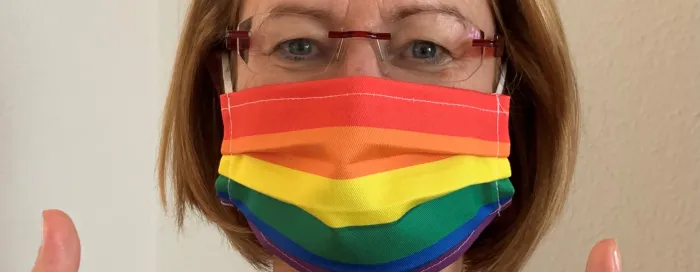This interview is part of our #LoveWhereILive campaign and of our series “#ProgressiveLocalStories”, aimed at raising awareness on the many positive initiatives implemented by progressive cities and regions in Europe. Cities and regions have become laboratories for innovative solutions and, with this series, we want to discover how progressive mayors, councillors and presidents of regions put in place policies to promote and protect LGBTIQ rights.
Ms. Grotheer, you are the Vice-President of Bremen State Parliament. Your city is a good model for the promotion and protection of LGBTIQ rights. As a progressive local politician, what do you think about the protection of LGBTIQ rights in your city and in Europe?
Bremen has always stood for open-mindedness and is a liberal, progressive Land. We strongly support diverse lifestyles and sexual identities. Issues such as equality for lesbians and gay people and the protection of the rights of intersex and transgender people have rightly gained further attention in recent years and have been brought into public focus. Our society thrives on diversity and the participation of all people, which are key prerequisites for a vibrant and functioning democracy. It is our job to eliminate and counteract existing discrimination – I have been advocating this for many years alongside my colleagues in both the German Social Democratic Party (SPD) and the other parties in Bremen's coalition government. It is clear that, although the German federal government or Bremen as a Land can set framework conditions, equality and a non-discriminatory society require more than that. They both also need to be applied in practice, which is what we, the Social Democrats, strongly advocate in our open-minded cities of Bremen and Bremerhaven.
What practical measures have you taken (or are you planning to take) to make your city one where the rights of LGBTIQ people are fully respected and promoted?
Bremen is well positioned in this respect, with the Action Plan to Combat Homophobia, Transphobia and Interphobia for the Land of Bremen, which was published in 2015, with the work of Rat&Tat-Zentrum für queeres Leben e.V. (Help and Advice Centre for Queer Life) and with the advisory committee for queer politics at the office of the Senator for Social Affairs, Youth, Integration and Sport. With the motion to improve the situation of queer refugees that was recently tabled in Bremen's parliament, we are championing recognition of the rights of this group of refugees through the Bundesrat (the upper house of the German parliament). In Bremen, we have also pushed for same-sex partners' right to marriage in the Bundesrat and support the addition of characteristics of sexual orientation and gender identity to Article 3(3) of Germany's Basic Law. For years, we have advocated providing long-term financial support from the budget for the work of queer initiatives and will continue to do so in the future.
Last year, the European Commission proposed its first LGBTIQ strategy and the European Parliament declared the EU an LGBTIQ freedom zone. How can the European Union further contribute to promoting LGBTIQ equality and why is this important for your city?
The Land of Bremen has embraced the EU initiative for an LGBTQIA+ Freedom Zone and decided in December 2021, through a parliamentary motion, to also make both our cities, Bremen and Bremerhaven, zones of freedom and respect for queer people and for this to be clearly visible. It has long been mandatory for the president of Bremen's senate (i.e. the de facto minister-president) to take part in the annual Christopher Street Day event and for the rainbow flag to be flown at various occasions at the town hall and the parliament building, and large sections of the population support this. We believe that making the queer community visible is a good way of ensuring that queer people gain the necessary acceptance and that their rights are sufficiently strengthened. However, it is also true that there is still a lot to be done, especially with regard to education. Nevertheless, we in the Land of Bremen are on the right track.
